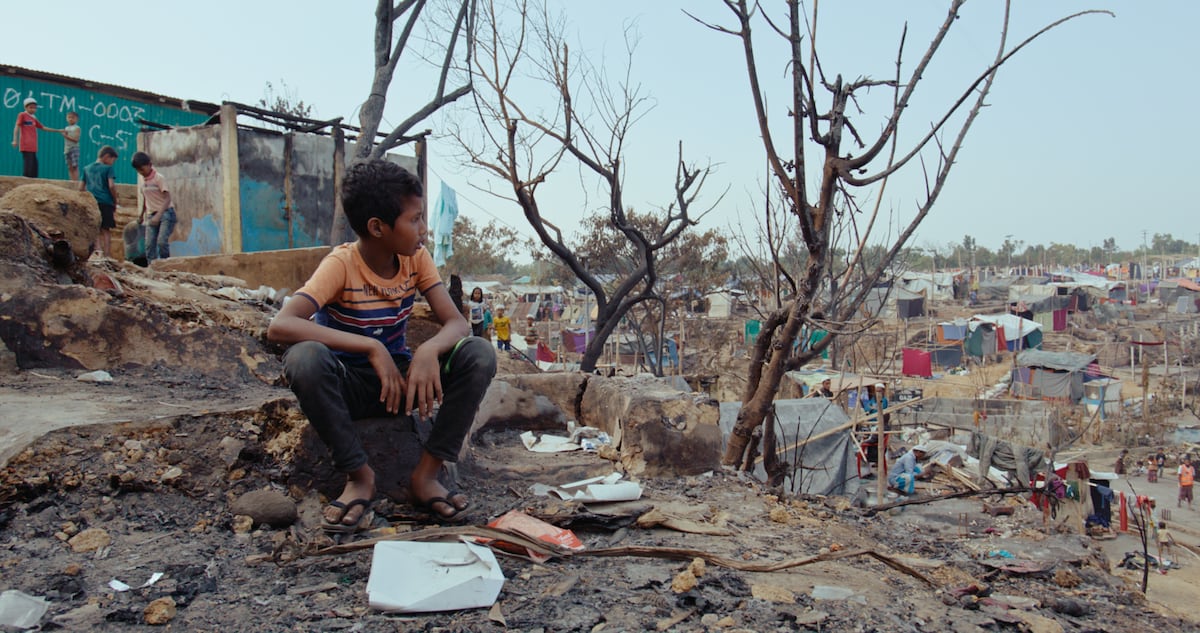Early on the morning of January 7, a fire devastated Rohingya refugee Camp 5 in Cox's Bazar, southeastern Bangladesh, leaving already vulnerable children scared and homeless.
As flames devoured their beloved backpacks, textbooks and learning centers, children mourned the loss of their education, a lifeline for their future.
There is nothing more gratifying than sitting on the floor of a classroom in the Cox's Bazar refugee camp and listening to Rohingya children tell you how much they want to learn and how they dream of receiving their daily lessons.
Those conversations, recorded in my head and in my heart, challenge us to do something more for these boys and girls who have already suffered so much in their short lives.
And yet, at 1 a.m. on January 7, flames swept through Cox's Bazar Camp 5, and children who had already lost so much lost even more.
Fires are too frequent in camps.
Today, Cox's Bazar is the largest refugee settlement in the world;
One million Rohingya depend on humanitarian aid for education, protection, food, water, shelter and basic health care.
Mohammad Rafiq, 14, is no stranger to fires that destroy everything he holds dear.
He has been living in Camp 5 for six years, after fleeing violence and persecution in Myanmar.
His family escaped when his village was burned down in August 2017. Rafiq's mother was the first to notice the flames engulfing her camp.
She watched as the fire approached her house.
Terrified, she evacuated her family and fled to a nearby camp with Rafiq and his brothers.
She didn't give them time to gather their belongings.
When the family returned home, they found only ashes.
They had lost everything.
In total, this fire left more than 5,000 refugees homeless, including 3,500 children.
Rafiq was especially devastated by the loss of his textbooks.
On the ground he found a partially burned leaf from one of them.
Clutching the page in his hand, he ran down the hill, passing the smoldering remains of the shelters and facilities of neighboring camps.
Where his school once stood was nothing but rubble.
In total, 11 Unicef-supported learning centers, where children studied and played, as well as six shelters used for Early Childhood Development classes, were burned to the ground.
Rafiq and 1,500 other children had lost their only means of education and a fundamental source of hope.
Some of his classmates had also run to check on their class.
His teacher, Ekram, who was clearing the rubble, remembers the question the students asked him: “Sir, our school has disappeared, our books too.
How are we supposed to study?”
For Rohingya refugee children, who dream of one day returning to their homeland and contributing to the future of Myanmar, education is everything
For Rohingya refugee children, who dream of one day returning to their homeland and contributing to the future of Myanmar, education is everything.
Rafiq, who is in fifth grade, loves studying Burmese, one of the languages taught in the camps, according to Myanmar's national curriculum.
“When I study Burmese, it helps me remember my homeland,” he says.
“My Burmese textbook had photos and stories from my country.
I only have one page left.”
Providing education to all children and adolescents in Cox's Bazar is an initiative of considerable magnitude.
UNICEF and its partners help 240,000 learn in 3,000 learning centres, with donors including Education Can't Wait (ECW), KfW Development Bank and the governments of Canada, Australia, the United States and the United Kingdom. United, among others.
Thanks to them, it was possible to launch the Myanmar curriculum pilot project in 2021, meaning that all Rohingya students can receive education in their national language, an important step to help them one day return home.
However, the education of adolescent girls remains a challenge.
They face significant barriers to learning due to social and cultural norms that restrict their movements outside their homes.
A Unicef survey conducted in 2023 among out-of-school adolescent girls in Cox's Bazar camps revealed that many parents are reluctant to let their daughters go to school for fear of their safety.
To address this, we have created community-based learning centers—classes held in homes close to where the girls live—with female teachers.
For concerned parents, this neighborhood educational model provides an additional guarantee.
A few weeks ago I met some of these girls.
Understandably shy at first, they became quite animated when I asked them if the sun revolves around the earth or vice versa.
They also wanted to ask.
We had a class of scientists!
It made me think about the promise and potential these young women hold and how important it is that we offer them learning solutions in their circumstances.
A few days after the fire, Unicef had created temporary learning centers that serve a dual purpose: they allow children to continue learning and help them recover from trauma.
We also distributed School in a Box kits, which included notebooks, crayons, pencils, rulers, and whiteboards.
And we returned the smile to Rafiq and many other students by distributing new textbooks to those affected by the fire.
Those smiles are priceless.
For girls and boys who have lost a large part of their childhood, the opportunity to learn is a lifeline.
Provides hope and healing;
it is a source of motivation;
and it is the path to a better future.
Let's do more for Rohingya children.
Sheldon Yett
is a UNICEF representative in Bangladesh.
You can follow
Planeta Futuro
on
X
,
,
and
TikTok
and subscribe
to our newsletter
here
.

